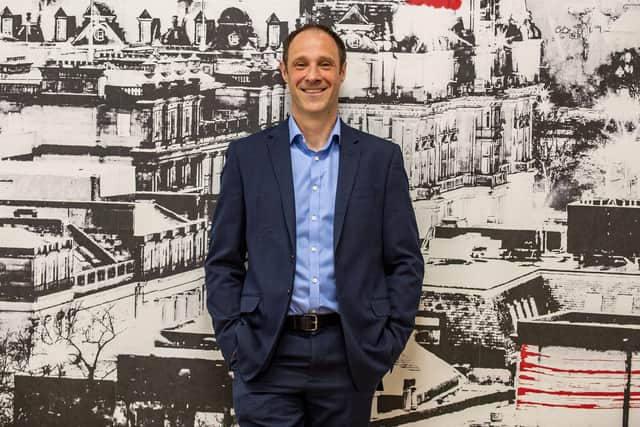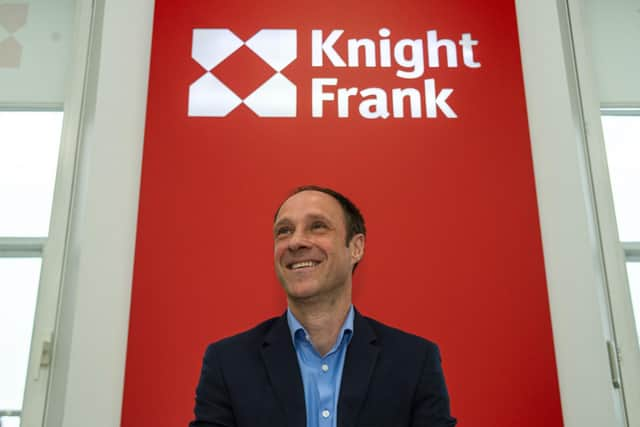The Big Interview: Alasdair Steele, head of Scotland commercial at property consultancy Knight Frank
and live on Freeview channel 276
The London-headquartered firm says it advises clients from individual owners and buyers to major developers, investors and corporate tenants, with more than 20,000 staff operating from 488 offices across 57 territories.
It can trace its roots back to 1896, with deals it has helped lock down since including a private sale of Stonehenge, and selling Chartwell to Winston Churchill.
Advertisement
Hide AdAdvertisement
Hide AdThe business opened in Edinburgh in 1913, and now Mr Steele is also responsible for the day-to-day running of its office in the Scottish capital. He has worked in investment teams in London and Scotland, and left DTZ – now known as Cushman & Wakefield – to join Knight Frank, where he is a partner, in 2010.
The latter provides regular analysis of Scotland’s commercial property market, for example in March saying Edinburgh was the most active UK city for hotel investment outside London, with Mr Steel commenting at the time that Scotland’s prime cities had “performed strongly since Covid restrictions began to ease”.
You said in January that Scotland’s commercial property market had proved its resilience over the previous two years. Could you elaborate on this, and cite any deals you feel have been key?
Transactional volumes in Scotland have held up remarkably well during the pandemic and we have seen pricing maintaining its pre-Covid levels, or even hardening in key areas of the market – prime offices, industrial and retail warehousing being the obvious examples.
Advertisement
Hide AdAdvertisement
Hide AdOne of the key reasons that investors are still looking to buy in Scotland is because the occupational markets have also held up surprisingly well. The pre-letting of 280,000 square feet at M&G’s The Haymarket scheme by Baillie Gifford in the midst of the pandemic was a remarkable indicator of the health of the Edinburgh office market.


Looking ahead, do you expect big changes in the split of where investment capital comes from? Looking at overseas investment specifically, this has funded the majority of deals in some years, but fell to less than half in 2021… and how much of an impact is Brexit having?
The sources of capital will ebb and flow over time, but what is key is that the market for Scottish property investment has now become truly global. It is no longer dominated by UK investors and there is keen interest from all corners of the world. There is a lot of money looking to invest in Scotland from both the Middle East and the United States at the moment, as well as continued interest from European and UK institutions.
The drop in numbers during 2021 seems to just be a blip caused by a small number of large transactions carried out by UK investors, which skewed the figures – the long-term trend should continue to show strong interest from overseas capital. It’s hard to have a clear view on the impact of Brexit just now, as there is so much going on globally. I think that will take a while to shake through.


Advertisement
Hide AdAdvertisement
Hide AdIt’s complicated and there is a number of different aspects to keep an eye on, such as whether European buyers cool on the UK and other international investors replace them.
On the back of the pandemic, industrials and retail warehousing have been performing very well – Knight Frank worked on the purchase earlier this year of the Royal Mail sorting office in Edinburgh’s Sighthill, for example – and how much do you expect the growth of these property sub-sectors to continue?
The trends in shopping habits that were already happening were accelerated during the pandemic, with a significant growth in online shopping turbocharging the industrial sector. Retail warehousing has done really well too, as people have become more used to doing their shopping in a retail park environment rather than travelling into a town centre.
Yields are continuing to harden and all the research suggests that tenant demand will outstrip supply, with rents continuing to grow. The jump in build costs at the moment could well further restrict the development pipeline in the short to medium term.
Advertisement
Hide AdAdvertisement
Hide AdIn terms of the office market, what does 2022 hold for Scotland’s key cities, and how much has the growth of the burgeoning tech sector increased demand for prime space?
It looks like being a strong year again – occupier demand remains robust and there are significant sales planned in both Edinburgh and Glasgow.
The pandemic has accelerated the move towards a better quality working environment – firms want their workplaces to be a stimulating and collaborative place in which their staff want to work, rather than the old fashioned idea of rows of desks, so there is likely to be a flight to quality, fit-for-purpose buildings.
This will also be influenced by the environmental, social, and corporate governance agenda, which has become hugely important very quickly for both owners and occupiers.
Advertisement
Hide AdAdvertisement
Hide AdThe tech sector is really important, especially in Edinburgh and Dundee, while Glasgow recently had its first Tech Fest. It’s something of a snowball effect where firms want to be near like-minded organisations.
We think there will continue to be growing demand from tech occupiers in each of these cities, while Aberdeen is beginning to emerge from the challenges of the pandemic, with office take-up in the first quarter of 2022 as high as it was during the whole of last year.
What about bricks-and-mortar retail? There are concerns about its longevity, and major anchors like Jenners in Edinburgh are set for changes of use – you’ve cited potential to convert retail spaces into prime office property…
Our high streets have had it really tough recently, but there are growing signs of recovery. Retailers have adapted their offerings to take into account new shopping patterns and it’s exciting to watch the re-birth of traditional retail areas within town and city centres.
Advertisement
Hide AdAdvertisement
Hide AdIf you take Edinburgh, for example, we are seeing Princes Street change into much more of a leisure offering, whereas George Street has bounced back surprisingly quickly from a retail perspective, with terms agreed on eight of the 11 units on the street that were previously vacant.
Our research earlier this year pointed to the fact that Glasgow and Edinburgh city centres have proven the most resilient major retail hubs in the UK, with the lowest over-supply of space among major cities outside London.
What has been the most significant property deal in your career – and why?
I would say it was the sale and leaseback of the TSB bank in Falkirk. It wasn’t a big deal but it was my first. I didn’t really know what I was doing and I remember standing by the fax machine at the closing date hoping I would get at least one offer.
Advertisement
Hide AdAdvertisement
Hide AdIn the end, that was exactly what I got – one offer, but it was a good one and, despite my naivety, the deal went through successfully. It was a strange mix of relief and elation – probably still how I feel today when a deal goes through!
You’re a keen environmentalist, and a key driver in Knight Frank teaming up with Surfers Against Sewage and announcing its bid to be a plastic-free business. Could you explain more about this?
I have always had a keen interest in the environment – in particular the marine environment. I have been a member of the great charity Surfers Against Sewage ever since I was a student in Aberdeen. Recently, it has been working to encourage communities to commit to reducing their use of single-use plastics.
I was sitting at home one Friday night and I decided to e-mail our managing partner to suggest that we should become plastic-free as a business. It felt like a good idea at the time, but I wasn’t so sure when I didn’t get a reply! It turned out he was away for the weekend and replied on the Monday saying he was fully behind the idea.
Advertisement
Hide AdAdvertisement
Hide AdSince then, it has been phenomenal – all our staff were given re-useable coffee cups and drink canisters, and we have massively reduced our plastic footprint across the business. I think it’s a sign of how larger businesses have changed – it’s no longer just about making profit, but also about your impact on society and the world in general.
Have you had a mentor or mentors in your career and do you mentor others? If so, what benefits have you found?
I think mentoring is hugely important, especially to young people. I am lucky enough to have worked with a couple of people in my career who have mentored me and who I knew I could totally trust and rely upon – it makes such a difference.
I mentor young people through The Prince’s Trust and have also signed up for our internal mentoring programme at Knight Frank. If I can help people with their career development in the same way others have helped me, then that would be great.
Comment Guidelines
National World encourages reader discussion on our stories. User feedback, insights and back-and-forth exchanges add a rich layer of context to reporting. Please review our Community Guidelines before commenting.
